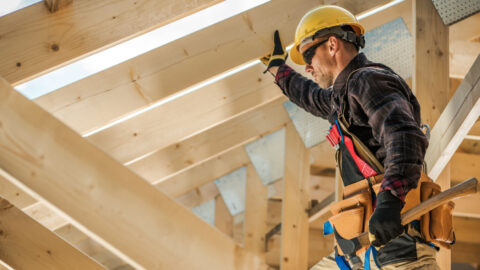Placing a new roof on your home or commercial building can increase its resale value, and boost curb appeal. If you’re considering installing a metal roof over shingles what do you need to know?
While it is possible with some buildings to place a metal roof over shingles, it’s not always an option. The condition of your current asphalt shingle roof will be a factor in making this decision, as well as a few other considerations. To help guide you in your decision-making, here are the pros and cons of installing metal roofing over an asphalt shingle roof, and four other factors to consider.
Pros
- Installing metal roofing over shingles is an environmentally friendly approach because those asphalt shingles and underlayment won’t fill up a landfill. You also save on disposal fees and labor costs.
- With no tear-off process, the roofing replacement will be a quieter process.
- The additional layers of roofing materials could give your home better insulation, which might pay off with lower energy bills.
Cons
- At most, you may only save a few hours of labor costs since skilled roofers with effective tools, like Shingle Eaters, make quick work of removing any asphalt roof.
- Roofing pros won’t be able to inspect and fix roof decking, trusses and other materials for damages, mold, mildew or rot if metal roofing is covering a layer of shingles.
- Moisture can become trapped between the asphalt shingles and the metal roof system, causing mold, mildew and rot. In a worst-case scenario, this could lead to structural failure.
- Placing a metal roof over shingles might void the warranties of your old and new roofing systems.
While you may save money by leaving the existing roof in place, many people have discovered that the risks far outweigh the benefits.
However, there are new solutions.
Here are four deciding factors to help guide your choices in roofing materials.
- Review the building codes in your area with your roofing contractor before making a choice. Keep in mind that Florida has some of the most strict building codes in the U.S. The fines for building code violations can be enormous. You may not have the option of placing new roofing materials over the old ones, regardless of what building materials you prefer. Before choosing roofing materials, check your local building codes for more information on roofing requirements.
- Older roofs with problems will cause issues with the new roofing materials. If roof decking is not uniformly square, straight and plumb, the metal roofing material could have ripples and puckers in the metal materials, a condition known as oil canning, which will be visible from your yard. It doesn’t affect the structural strength of the roofing material, but it can be an aesthetic issue.
Additionally, adding more weight to your existing roof can sometimes lead to structural damage, like buckling or sagging, which will only worsen your roofing issues over time. - Check whether moisture will be trapped between roofing materials. The reason homeowners choose metal roofing is the material’s durability and longevity, but if moisture or condensation gets trapped between the metal roof and your asphalt shingles, it could lead to problems. The roofing underlayment is your last line of defense against moisture. But if the integrity of that underlayment is compromised, placing the new roofing material over the top of the old will predictably lead to serious problems over time.
- Check your roofing warranty language. Metal roof manufacturers may require you to install their roofing materials directly on the home, without old materials underneath. Failing to follow the installation guidelines could lead to voiding your roofing material warranty.
Embracing Metal Roofing Over Shingles
If your existing roof is still strong, and you decide to embrace metal roofing over shingles, be advised that any metal roofing project does require higher upfront costs than an asphalt shingle roof. In exchange, you will be getting durability and longevity. Metal roofing should last from at least 50 to 70 years. Metal can also add curb appeal because the materials come in a large variety of styles and colors.
Longevity and aesthetics aside, metal is eco-friendly. It is made from recycled material and is 100 percent recyclable at the end of its lifespan.
With your choice of metal roofing made, the next step involves installation. Because metal panels shrink and expand during temperature fluctuations, metal panels are rarely affixed directly to the asphalt roof. Let’s explore the most common installation techniques.
Metal Panels Attached to Furring or Lathing Strips
In this scenario, wood purlins or sub-girts are used as furring strips on the old roof and attached to the structure below. This framing system is able to be installed directly on top of the existing shingles or applied over the existing decking or underlayment. The new metal roof panels are then attached to the framing system.
With the added cost of furring strips and installation, the final price can be similar to a tear-off, so cost-wise it’s a bit of a wash. Although, it is undoubtedly more environmentally friendly since the shingles remain in place. This approach does add weight to the structure, so you may have to engage a structural engineer to determine if the home can safely support the additional weight.
If pressure-treated wood is used for the furring strips, the copper elements in the treated wood will aggressively attack the metal in the panels. As a result, a barrier of #30 felt or a synthetic underlayment should be used between the wood framing and the metal panels to avoid this chemical reaction.
Metal Panel Attachment to Shingles
One of the most cost-effective installation strategies is attaching metal roof panels directly through the shingles and into the roof deck below. Several metal roof manufacturers have created patented roof systems to achieve this. While this method saves the cost and labor of furring strips, if there are deck and shingle inconsistencies, those will be revealed through the metal panels, through oil canning.
While this does not affect panel performance, it does affect aesthetics. Homeowners with a high emphasis on aesthetics may be happier with the remove-and-replace approach.
The direct attachment approach was plagued by the difficulty of achieving above-sheathing ventilation (ASV). ASV is pertinent to reducing energy consumption for homeowners. Fortunately, manufacturers have created new patented solutions.
For example, ATAS International offers a new ASV Spacer Shim. Above-sheathing ventilation (ASV) is achieved by having continuous airflow between the roof sheathing or wall assembly and the metal panel systems. It creates energy savings by reducing air-conditioning costs in the summer and adding insulation value during the winter as proven by studies and testing performance sponsored by Metal Construction Association (MCA) at Oakridge National Lab. ASV also minimizes the effect of condensation between the roof layers and wall assemblies.
Interested in metal roofing for your home? Contact John Hogan Roofing for a free estimate today. As a full-service roofing contractor, we also offer roof inspections. Roofing materials we use include asphalt shingles, as well as tile roofing and metal roofing.
HAVE THE WORK COMPLETED RIGHT THE FIRST TIME
You May Also Like:
Benefits of Integrating Solar Panels with Your Roof in Florida
In the Sunshine State, it’s no secret that the sun shines bright nearly all year long. Florida is not only a paradise for beach lovers but also an ideal location for harnessing solar energy. If you’re a homeowner in Florida, you’ve probably considered integrating solar panels into your home, especially as the state continues to…
Read More15 Crucial Questions to Ask Before Hiring a Roofing Contractor in Florida
15 Crucial Questions to Ask Before Hiring a Roofing Contractor in Florida (And Why They Matter) In Florida, where hurricanes, heavy rain, and intense sunshine are part of everyday life, your roof is more than just a cover — it’s your home’s first line of defense. So, when it comes time for a roof repair…
Read MorePreventative Roof Maintenance Tips for Hurricane Season in Florida
Florida’s hurricane season runs from June 1 to November 30, bringing high winds, heavy rains, and potential roof damage. Your roof is the first line of defense against these extreme weather conditions. Even minor vulnerabilities can lead to costly damage during a storm without proper maintenance. This guide provides essential preventative roof maintenance tips to…
Read More



